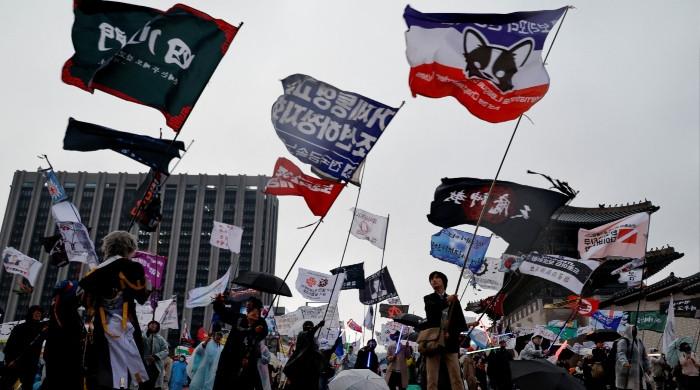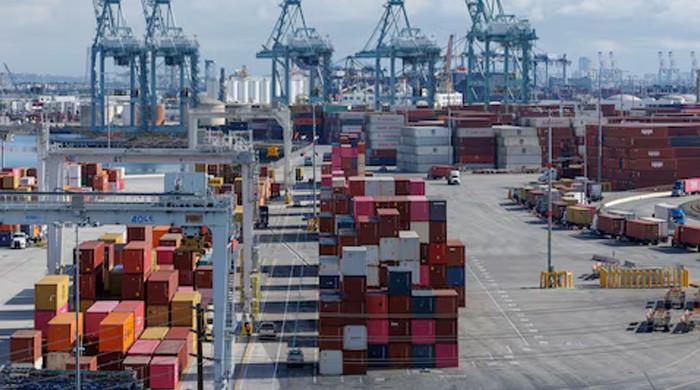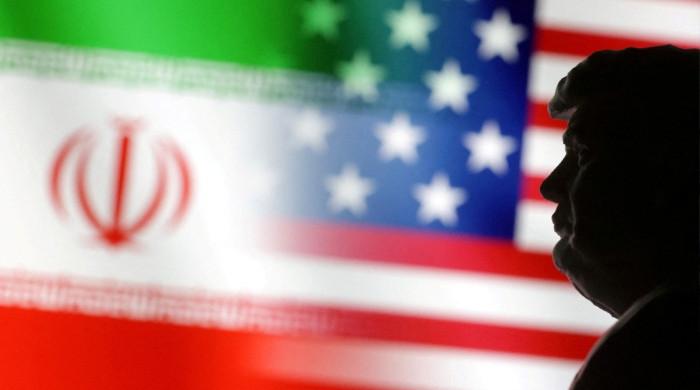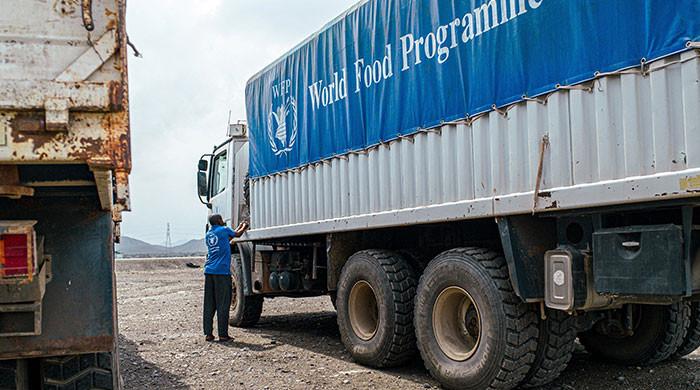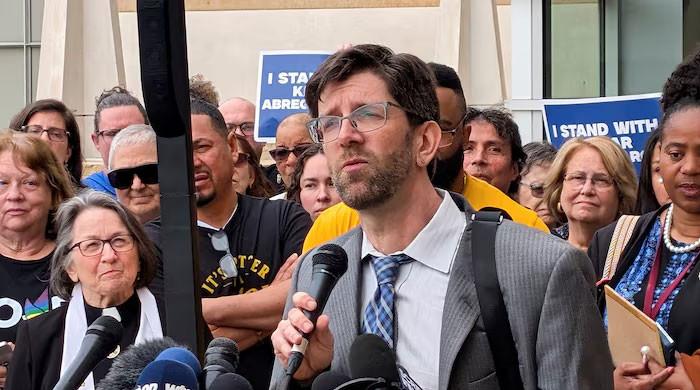Egyptians on fire after 74 die in soccer tragedy
CAIRO: Egyptians incensed by the deaths of 74 people in soccer violence clashed with security forces on Thursday during protests against the army-led government for failing to prevent the deadliest...
February 03, 2012
Security forces fired tear gas at demonstrators near the headquarters of the Interior Ministry in Cairo, prompting hundreds to flee. "Down down with military rule," they chanted, many holding aloft pictures of those killed.
State media reported scuffles between members of the security forces and demonstrators who included hardcore soccer fans known for confronting the police and who were on the frontlines of protests against the state in the last year.
Earlier, a Reuters witness saw a dozen masked youths remove a barbed wire barrier blocking one route to the Interior Ministry and then throwing stones at riot police standing guard.
The Interior Ministry said in a statement that security forces were protecting the building after protesters cut the wire barricades and climbed over concrete walls in an attempt to reach the building.
As tear gas canisters flew, witnesses saw unconscious people being ferried away from the area on motorbikes and ambulances raced to the scene.
The incident at the stadium in Port Said on Wednesday night was Egypt's worst ever soccer disaster. Bodies were unloaded from a train at Cairo's main train station, covered by blankets.
"Where is my son?" screamed Fatma Kamal, whose frantic phone calls seeking news of her 18-year-old had gone unanswered. "To hell with the football match ... Give me back my boy."
At least 1,000 people were injured in the violence when soccer fans invaded the pitch after local team al-Masry beat Cairo-based Al Ahli, the most successful club in Africa.
Hundreds of al-Masry supporters surged across the pitch to the visitors' end and panicked Ahli fans dashed for the exit. But the steel doors were bolted shut and dozens were crushed to death in the stampede, witnesses said.
"I suddenly heard a commotion and ran to the door to find people getting crushed ... with their legs stuck in between the iron bars," said Ahmed Moustafa Ali, an electrician employed at the stadium who witnessed the incident.
"The doors were locked because the rules stipulate that we don't let fans leave at the same time," he said.
The gate lay broken outside the ground on Thursday. Under it lay a pool of blood and shoes were scattered around. The front page of one newspaper announced "A Massacre in Port Said."
The incident has triggered fresh criticism of the ruling military council, which has pledged to hand power to an elected president by the end of June. The head of the council said any attempts to cause instability would not succeed.
In the newly-elected parliament, MPs including the Islamists who control some 70 percent of the chamber demanded the government be held to account during an emergency session attended by Prime Minister Kamal al-Ganzouri.
Addressing angry lawmakers, Ganzouri said senior security chiefs in Port Said and the city's governor had been suspended and the soccer federation's board had been sacked. But he disappointed those seeking tougher steps, such as firing the interior minister.
Some MPs echoed the suspicion of many Egyptians that the incident was the work of remnants of the Mubarak administration trying to derail reform.
INQUIRY
The MPs voted to launch an investigation into what happened and lodge a formal complaint with the military against Interior Minister Mohamed Ibrahim, accusing him of negligence.
The Supreme Council of the Armed Forces, headed by Mubarak's long-time defense minister, vowed to track down the culprits and declared three days of national mourning.
"Egypt will be stable. We have a roadmap to transfer power to elected civilians. If anyone is plotting instability in Egypt they will not succeed," Field Marshal Mohamed Hussein Tantawi, head of the military council, told Al Ahli's TV channel.
While the generals have vowed to steer Egypt towards democracy, they are seen by critics as an extension of Mubarak's rule and an obstacle to real reform. Repeated protests in the last two weeks have urged them to step down right away.
"The military council lost its legitimacy today given the blood that has been shed," Mustafa Naggar, an MP from the Justice Party, said in parliament.
Tantawi voiced deep regret over the incident and offered condolences to the families of the victims.
It did little to assuage the anger of fans, who, like many Egyptians, are furious that Egypt is still plagued by lawlessness and violence almost a year after Mubarak was driven out.
"The people want the execution of the field marshal," fans chanted at the Cairo rail station. "We will secure their rights, or die like them," they said as bodies were unloaded from the trains.
In Egypt's second city of Alexandria, thousands echoed their cry.
The post-match pitch invasion provoked panic among the crowd as rival fans fought. Most of the deaths were among people who were trampled in the crush of the panicking crowd or who fell or were thrown from terraces, witnesses and health workers said.
"The rush caused a stampede, people were pushing each other against the metal door and stepping on each other," said one witness who attended the match, 23-year-old Ossama El-Zayat.
"We saw riot police firing shots in the air, and then everyone got scared and kept pushing against the locked door. We didn't know whether police were firing live rounds or not. People were crying and dying," he said.
Some saw the violence as orchestrated to target the "Ultras," Al Ahli fans whose experience confronting police at soccer matches was turned with devastating effect against Mubarak's heavy-handed security forces in the uprising.
They played a significant role in defending Cairo's Tahrir Square, the heart of the uprising against Mubarak, when men on camels and horses charged protesters last year. Thursday is the anniversary of the February 2 camel charge.
Yet many Egyptians still see the army as the only guarantor of security. When one activist in a group outside a hospital accused the army of sowing chaos, a man chimed in blaming the youths: "Security has to return to the streets. Enough with all those protests that caused this security vacuum," he yelled.
'THUGS'
Some blamed the violence on "thugs," the hired hands or plain clothes police officers of Mubarak's era who would often emerge from police lines to crush dissent to his rule.
"Unknown groups came between the fans and they were the ones that started the chaos. I was at the match and I saw that the group that did this is not from Port Said," said Farouk Ibrahim.
"They were thugs, like the thugs the National Democratic Party used in elections," he said, referring to Mubarak's former party and the polls that were routinely rigged in its favor.
The two soccer teams, al-Masry and Al Ahli, have a history of fierce rivalry. Witnesses said fighting began after Ahli fans unfurled banners insulting Port Said and one descended to the pitch carrying an iron bar at the end of the match.
"I saw people holding machetes and knives. Some were hit with these weapons, other victims were flung from their seats, while the invasion happened," Usama El Tafahni, a journalist in Port Said who attended the match, told Reuters.
Many fans died in the subsequent stampede, while some were flung off their seats onto the pitch and were killed by the fall. At the height of the disturbances, rioting fans fired flares straight into the stands.
Television footage showed fans running onto the field and chasing Al Ahli players. A small group of riot police formed a corridor to protect the players, but they appeared overwhelmed and fans were still able to kick and punch players as they fled.
Interior Minister Ibrahim said 47 people were arrested.
Egypt's football federation said it was indefinitely postponing matches in the premier league. Al Ahli club suspended all sports activities and declared three days of mourning. (Reuters)




